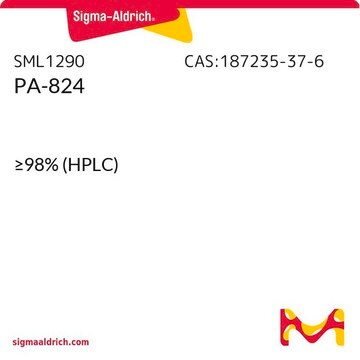SML4007
TMC207

≥98% (HPLC)
Synonym(s):
(αS,βR)-6-Bromo-α-[2-(dimethylamino)ethyl]-2-methoxy-α-1-naphthalenyl-β-phenyl-3-quinolineethanol, (1R, 2S)-1-(6-Bromo-2methoxy-3-quinolinyl)-4-(dimethylamino)-2-(1-naphthalenyl)-1-phenyl-2-butanol, Bedaquiline, R 207910, R-207910, R207910
About This Item
Recommended Products
Quality Level
Assay
≥98% (HPLC)
form
powder
optical activity
[α]/D 195.0 to 155.0° (c = 0.5g/100mL in DMF)
color
white to beige
solubility
DMSO: 2 mg/mL, clear
storage temp.
-10 to -25°C
SMILES string
BrC(C=C1)=CC2=C1N=C(OC)C([C@@H](C3=CC=CC=C3)[C@](O)(C4=CC=CC5=C4C=CC=C5)CCN(C)C)=C2
Biochem/physiol Actions
TMC207 (Bedaquiline; R207910) is an orally active, potent and selective mycobacterial ATP synthase inhibitor (M. smegmatis IC50 = 2.5 nM or 1.4 ng (non-salt form)/mL; human mitochondrial ATP syntase IC50 >200 uM) with broad-spectrum anti-mycobacterial activity (MIC 10-120 ng/mL), including M. bovis, avium complex (MAC), kansasii, marinum, fortuitum, abscessus, smegmatis, ulcerans, and both drug-susceptible and multiple drug-resistant M. tuberculosis strains (to rigampin, isoniazid, streptomycin, ethambutol, pyrazinamide, fluoroquinolone).
Signal Word
Warning
Hazard Statements
Precautionary Statements
Hazard Classifications
Aquatic Chronic 1
Storage Class Code
11 - Combustible Solids
WGK
WGK 3
Flash Point(F)
Not applicable
Flash Point(C)
Not applicable
Certificates of Analysis (COA)
Search for Certificates of Analysis (COA) by entering the products Lot/Batch Number. Lot and Batch Numbers can be found on a product’s label following the words ‘Lot’ or ‘Batch’.
Already Own This Product?
Find documentation for the products that you have recently purchased in the Document Library.
Our team of scientists has experience in all areas of research including Life Science, Material Science, Chemical Synthesis, Chromatography, Analytical and many others.
Contact Technical Service







